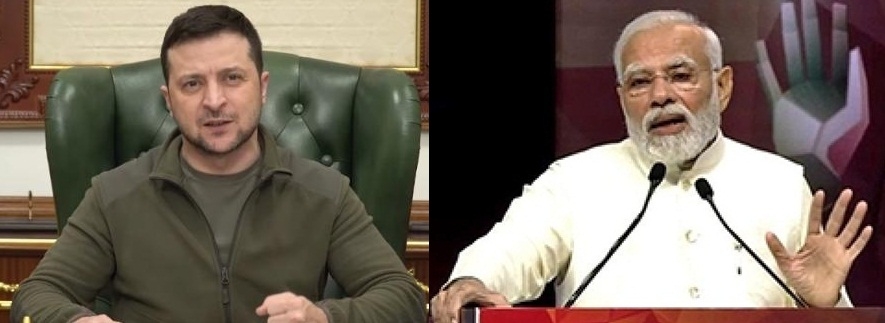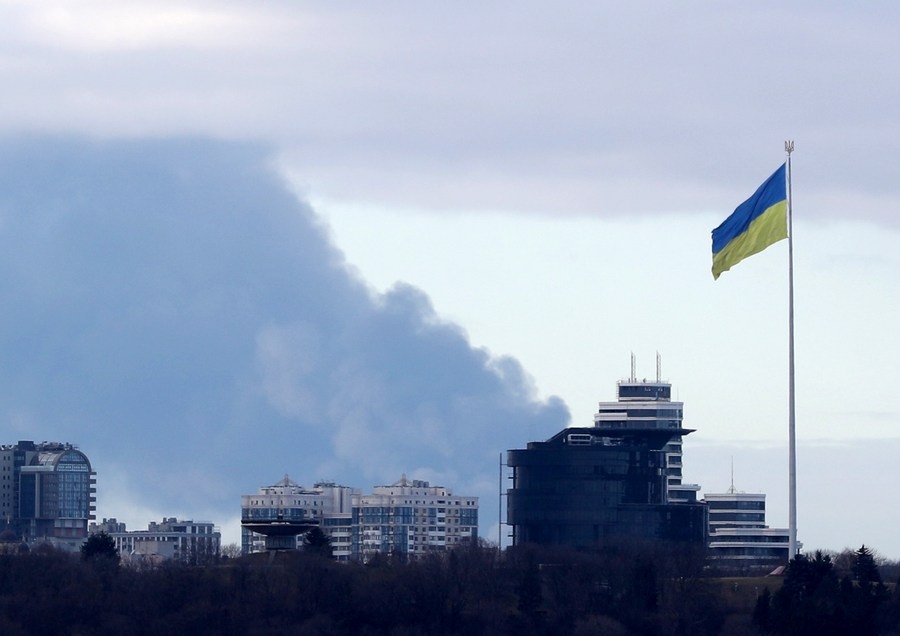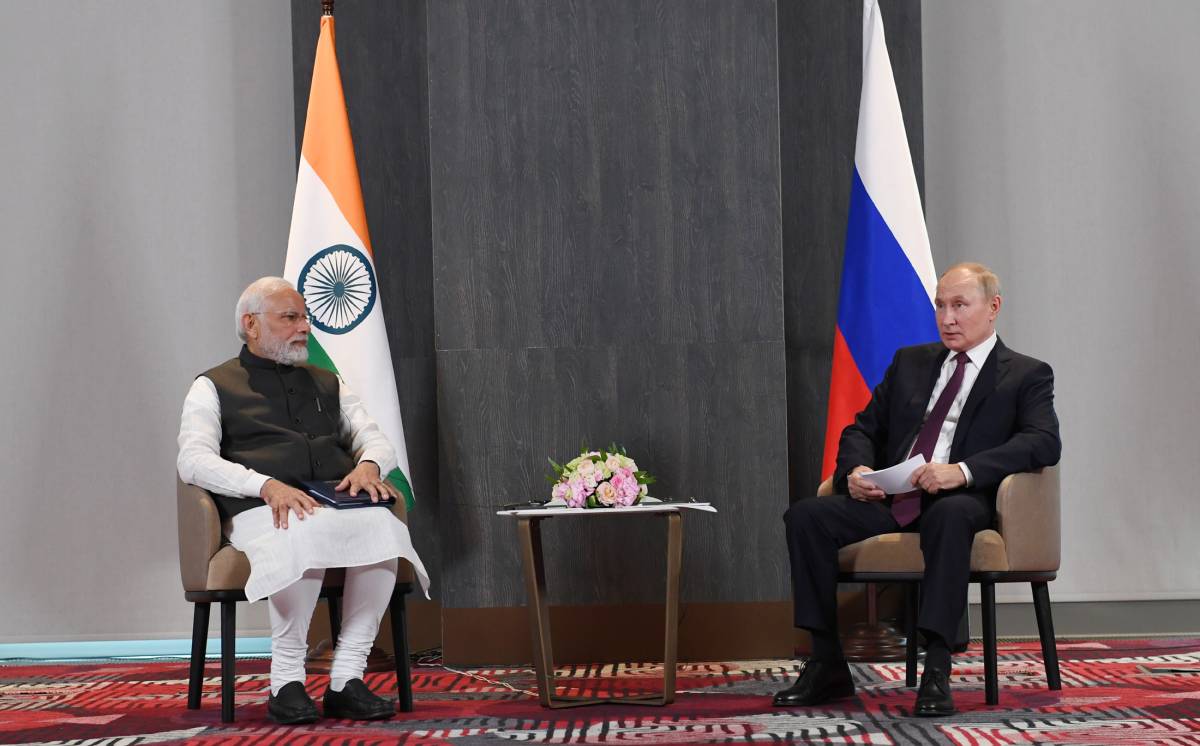It is noteworthy that beyond the UN that faced resolutions critical of Putin in the Ukraine- Russia conflict, India’s position as a possible mediator acceptable to both sides, has been acknowledged more than once by the unbiased sections of the international community, writes D.C. Pathak
One of the great foreign policy feats of Prime Minister Narendra Modi is that he stood upfront on the military conflict between Russia and Ukraine — sparked by the launch of Russian military operation in February 2022 to support the Russian-speaking eastern provinces of Ukraine against the alleged suppression of their rights by Ukraine — and took a line that both sides had concerns which should be resolved through peaceful negotiations.
The US-led West joined the fray in support of Ukraine amid appeals from President Volodymyr Zelensky for grant of NATO membership to Ukraine and the conflict went on to assume the proportions of a ‘war’ with no end in sight.
The US and its allies are merely supplying arms, ammunition and sophisticated war material to Ukraine, creating an impression that they were conducting a ‘proxy war’ against Russia.
It is possible that the US saw in its strategy a parallel with the anti-Soviet armed campaign in Afghanistan that had ultimately led to the withdrawal of the Soviet army and the demise of the USSR.
However, it is becoming increasingly clear that Vladimir Putin’s Russia is not getting worn down and it is Ukraine that is taking the real hit in terms of loss of life and assets.
President Putin has referred to the effectiveness of tactical nuclear weapons, but clearly not betrayed any desperation about using them in this conflict. He is still pursuing the original aim of protecting the eastern provinces of Ukraine closely identified with Russian interests and has again gone on record to claim that he wants to end the conflict.

The total scene around this military confrontation of geopolitical significance suggests that it is still not an irreversible case for return to peace. What is needed is a credible global level mediation acceptable to both sides.
It is noteworthy that beyond the UN that faced resolutions critical of Putin in the Ukraine- Russia conflict, India’s position as a possible mediator acceptable to both sides, has been acknowledged more than once by the unbiased sections of the international community.
Prime Minister Modi became the first world leader to call for cessation of hostilities and recourse to peaceful negotiation to resolve the Ukraine-Russia conflict. He told the Russian President that ‘this is not an era of war’, and subsequently voiced India’s firm opposition to use of nuclear weapons when there were speculations about possible induction of tactical nuclear missiles by Putin to achieve his goal in the war with Ukraine.
These responses made India the sane voice in the world and established Prime Minister Modi as a global counsel on issues of war and peace.
Modi has spoken to the two Presidents more than once and has kept up hopes in the prospects of return to peace sooner than later.
The success of India’s foreign policy in the Modi regime can be measured by the fact that India’s friendly bonds with Russia do not come in the way of the deep and natural strategic friendship of India with the US, which was the hallmark of convergence between the two largest democracies of the world and – what is even more significant – by the fact that US President Joe Biden and Putin both understood India’s geopolitical position.
Interestingly, Putin now taking decisions on the readings of his own intelligence set up would be doing so with much greater confidence since he has a first-hand experience of the flaws and strong points of the latter and perhaps could see things in the wider global perspective even better than before.
Any attempt at mediation between Russia and Ukraine can hope to succeed only if the background of the conflict is clearly understood and steps recommended to establish lasting trust among the two neighbours accordingly.
When the Cold War ended consequent on the dismemberment of USSR and the termination of the Warsaw Pact, the emergence of East European states as independent nations, besides the rise of Central Asian Republics (CARs), left the residual Soviet Russia as a much smaller empire.
The US-led West might have done well to work for peaceful coexistence between Russia and its neighbours. Certainly, a high-pitch combative alliance like NATO did not hold the earlier ground as American hostility towards Russia did not have to exist at the level of the Cold War era.
In fact, in the unipolar world order, the US was expected to work for world peace while militarily safeguarding American interests across the globe.
Former US President Donald Trump treated Russia at par with European nations and seemed to have little problem with Putin – he was in the process able to deal with China on a stronger note of military and economic deterrence.
The advent of Biden Presidency saw a reversal of US attitude towards Russia – this could be in part because of the controversy that the crucial Presidential poll had left behind on the issue of Russian ‘interference’ in the American elections.

Biden declared Russia as the prime adversary for the US and underlined the trans-Atlantic alliance with Europe in a manner that underscored the continued use of NATO as a deterrent against Russia.
Putin’s action against Ukraine gave Biden a justifiable ground for confronting Russia.
The Ukraine-Russia conflict precipitated in February 2022 as Putin ordered ‘military operation’ in eastern Ukraine, ostensibly to safeguard the rights of the Russian speaking population there in the face of a simmering agitation continuing in those parts.
The situation rapidly worsened because of the declared policy of Zellensky to seek NATO membership to militarily respond to Russia and the decision of the US-led West to join the Ukrainian side by pumping in arms and ammunition into Ukraine.
The backdrop of the continuing tension between Russia and Ukraine going back to the annexation of Crimea by Russia in 2014 – with the West beginning the spell of sanctions on Russia to express its support to Ukraine then – is also linked to the aggravation of the Russia-Ukraine military conflict this time.
The development regarding Crimea – a territory of vast strategic import for Russia on the Black Sea – had preceded an anti-Russia uprising there in which Islamic fundamentalists blessed by the West had played a major part.
Significantly, Putin also supported Syrian President Assad in the ‘civil war’ precipitated by Islamic militants against him – with US backing.
Russia might have been specially sensitive to the ‘destabilisation’ of Crimea because of what the USSR had experienced in Afghanistan – perhaps Putin considered it legitimate to get the territory ‘back to Russia’ since it was earlier ‘gifted’ by Nikita Khrushchev to Ukraine internally, according to some authentic accounts.
The whole point is that there was no push back on the part of the West from the Cold War confrontation even after the USSR had collapsed in 1991 and international Communism on which it rested, had ended.
An international team of negotiators, including Indian representatives, can start a dialogue with Ukraine and Russia with their consent.
As mentioned earlier, mediators have to acknowledge the security concerns of the two warring nations and try to find their redressal in a mutual peace agreement that neighbours with different governance models could adhere to.
An immediate ceasefire pending a negotiated settlement would be necessary and supply of armament and ammunition to Ukraine from outside would has to be halted.
Restoration of democratic government in Ukraine based on ‘one man one vote’ and equal rights for all citizens regardless of language, community and region is extremely important.
Ukraine must declare that it is not seeking NATO membership. Lifting of sanctions against Russia may be considered consequent on a withdrawal of Russian troops from Ukraine to their side of the border.
An effective peace pact between Russia and Ukraine governing their future relationship should be the final outcome of the mediation.
The US would do well not to create a geopolitical situation where Russia and China would jointly deal with the West and accelerate the reemergence of Cold War between two matching powers.
This will, among other things, impede the processes of international economic cooperation already set in motion. The virtual summit between Putin and Xi Jinping on December 30 reaffirmed that Russia-China strategic friendship is deepening further and blamed those who were, according to them, instigating the Cold War mentality.
The meeting acquires special significance in the backdrop of the ongoing Russia-Ukraine military conflict. The polarisation between the US-led West and China-Russia combine will no more be totally ‘ideological’, considering the ‘Sinicization of Marxism’ initiated by Xi Jinping and the emphasis placed on Russian national pride by Putin, and this would minimise the possibility of internal differences cropping up among them over claims on Marxist-Leninist thought.
The two countries shared a system of dictatorship that opposed the US – and this in fact would act as the more important binding element for them.
As far as India is concerned, Indo-Russia friendship is one reason why China at least pretends that it wants to maintain good relations with India.
India has to watch out against China continuing to practice its ‘two steps forward one step backward’ policy in spite of such pretences.
In the final analysis, the US and Europe should work to return to democracy in all countries that were once a part of the USSR. This will be a useful long-term strategy for the US to maintain its geopolitical hold and global acceptability.
Enlargement of the democratic order can be an effective counter to Chinese expansionism and Russia’s possible strategic aim of bringing back the former USSR territories under its influence.
This provides an additional non-military route for the US for maintaining its supremacy as the leader of the democratic world.
Prime Minister Modi’s mandate that ‘this is not an era of war’ in fact strengthens Biden’s hands. India must continue to press for a peace negotiation between Russia and Ukraine without any preconditions being set by either side.
(The writer is a former Director of Intelligence Bureau. The views expressed are personal)

Leave a Reply